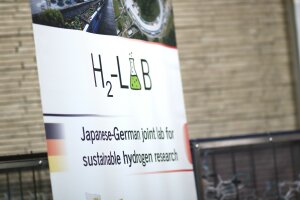Since 2018, the Faculty of Biology and Biotechnology at RUB has been running an International Joint Lab, which was set up as part of Osaka University's Internal Joint Research Promotion Program. The faculty and Osaka University's Institute for Protein Research (IPR) officially signed a cooperation agreement in October 2017. This complements the cooperation between the two universities that has been established since 2010.
As part of its university-wide cooperation, RUB has several exchange positions with Osaka University, which are in high demand. Students who take advantage of the exchange come from all departments. With the LabExchange program, RUB also supports research stays for master's and bachelor's students in order to promote student mobility and research-oriented learning and to enable students to develop intercultural skills. The targeted involvement of students in international research contexts is intended to initiate and consolidate sustainable cooperation structures. In this context, the RUB research groups offer an eight-week exchange program with Osaka University in the fields of biocatalysis, protein biochemistry, and structural biology.
Interested students should provide evidence of excellent academic performance and language skills (at least English). They should be motivated to engage in intercultural exchange and have an interest in Japanese culture. First, you must find a group leader at RUB who cultivates research collaborations with Osaka University. If the stay is academically meaningful, this person can provide you with a letter of recommendation for the LabExchange program, for example, and will take care of the further supervision and coordination of your stay. Our group, for example, regularly offers internships in the field of biocatalysis and/or structural and protein biochemistry in cooperation with Prof. Genji Kurisu. In principle, however, once you have found a supervisor at RUB, other working groups at Osaka University are also open to you. Please note that RUB (and we) are not obliged to arrange internships for students in Japan and only make decisions based on qualifications and open projects. The Japanese cooperation partners also have to devote time and expertise to you, so planning your stay requires sufficient time in advance.
The research visits are offered in particular to advanced bachelor's and master's students. Funding is provided in conjunction with the LabExchange program.
If you are interested in one of our research areas, particularly biocatalysis, protein engineering, and general structural biology (cryo-EM), please contact us directly by email (thomas.happe@rub.de). We will interview you briefly to get to know you. If you are potentially qualified, we will usually conduct a supervised module lasting up to several weeks in advance in our group at RUB to introduce you to the general techniques. You will then conduct your research stay in Prof. Kurisu's Protein Crystallography group at the IPR at Osaka University.
In principle, a thesis can be supported by work at Osaka University as part of an internship. However, a stay for the entire laboratory work phase of your thesis can only be provided in exceptional cases. Your work in Japan will therefore mostly represent partial results. However, this is a common procedure, and we have already sent many students to Osaka to carry out specific structural biology work for their theses.
Students seeking funding through the LabExchange program should check the LabExchange website for application deadlines. Before doing so, interested parties should have contacted their desired research department on the German side and received confirmation of academic supervision. We do not have any fixed deadlines within the year.
All costs for the flight and arrival/departure by public transport as well as accommodation will be covered. Usually, accommodation is available in a university-operated guest house or student dormitories near the institute, which we will arrange for you.
The typical duration of stay in Japan is 2-3 months.
The stay is accredited as a block internship worth 15 CP for M.Sc. and B.Sc. degrees.

